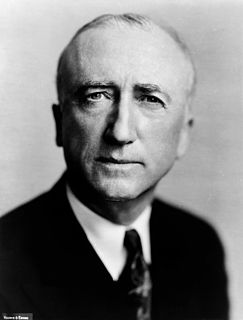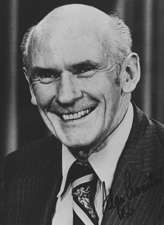A Quote by John O. Brennan
The United States is the first nation to regularly conduct strikes using remotely piloted aircraft in an armed conflict. Other nations also possess this technology. Many more nations are seeking it, and more will succeed in acquiring it.
Related Quotes
In full accordance with the law - and in order to prevent terrorist attacks on the United States and to save American lives - the United States government conducts targeted strikes against specific al-Qa'ida terrorists, sometimes using remotely piloted aircraft, often referred to publicly as drones.
There are many who criticise the United Nations. And those of us who know this institution well know that it is not immune from criticism. But those who argue against the United Nations advance no credible argument as to what should replace it. Whatever its imperfections, the United Nations represents a necessary democracy of states.
For the world to supersede the United States and for the United States to become subservient to the world, which is the United Nations in practical application, just rubs people the wrong way. Because the United Nations is nothing but a fleece organization, fleecing our money, under the guise that we owe it because we've committed so many injustices and transgressions.
Meanwhile, the U.S. debt remains, as it has been since 1790, a war debt; the United States continues to spend more on its military than do all other nations on earth put together, and military expenditures are not only the basis of the government's industrial policy; they also take up such a huge proportion of the budget that by many estimations, were it not for them, the United States would not run a deficit at all.
Breaking the United States up into a number of pieces could be very good for the integration of those new nations with the rest of the world and the international law whose primary enemy is now the United States government. I think that it would be very good for democracy, for people to be within some hundreds of miles of their nation's capital, as they are in many other countries, so that they didn't have to travel thousands of miles to protest, to exercise their First Amendment rights, but that is the current state of affairs in this overly large, imperial nation.
The United Nations exists not merely to preserve the peace but also to make change - even radical change - possible without violent upheaval. The United Nations has no vested interest in the status quo. It seeks a more secure world, a better world, a world of progress for all peoples. In the dynamic world society which is the objective of the United Nations, all peoples must have equality and equal rights.
Unfortunately, the United States and a few other governments have used the war on terrorism as a way of violating human rights. I am referring to the case of the Guantánamo Bay prisoners. This violation of the rights of prisoners has been so unbelievable that the United Nations has reminded the United States repeatedly that the treatment of prisoners should take place according to the preestablished conventions of the United Nations.
The United States of course wants to follow the highest standards of conduct with regard to enemy combatants who follow the rules of war. It should and does follow the Geneva Conventions scrupulously when fighting the armed forces of other nations that have signed the Geneva Conventions or follow their principles.
We've always defined conflict fairly broadly from ideological conflict to troops on the ground. For quite some time we've talked about a focus on Palestine. Certainly no one can deny that Israel is conflict with Palestine and no one can deny that the U.S. is the largest supporter of Israel internationally - not only financially, but also in the United Nations where the United States is one of the very few countries that does not recognize Palestine as a state.


































